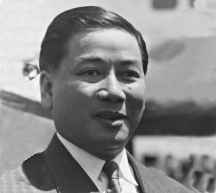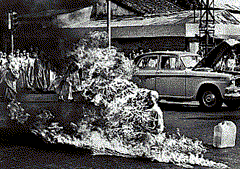|
Ngo Dinh Diem – First President
of the Republic of Vietnam
|
Abstract

Ngo Dinh Diem,a devout Roman Catholic, became Vietnam's First President
of the Republic of Vietnam. His nationalism and drive to end communism
made him a prominent figure in Vietnam. However, his favoritism of
Catholicism and discontentment with Buddhists made him a target of generals
from the Army of the Republic of Vietnam. The Army planned a coup d'etat
against him and his brother Nhu. America, now humilated at Diem's dictatorship
and bad decisions, did not want to help Diem and his government. On November
2, 1963, Diem and his brother were assasinated.
Historical
Background
On January 3, 1901 in Hue, Vietnam, Ngo Dinh Kha,
a high-ranking mandarin (civil servant of the Annamese Emperors who ruled
Indo-China), became father of the third of six sons he would have.
To the family name of Ngo were added the middle name of Dinh and the given
name Diem, which means burning jade in Vietnamese. The Ngo family comes
from a clan of leaders who for 1,000 years defended the Vietnamese against
Chinese invaders. In the early seventeenth century, the Ngo family converted
to Catholicism; holding on to their faith.
Ngo Dinh Kha developed a deep resentment against
the French when they deposed his sovereign as Minister of Rites and Grand
Chamberlain to Emperor Than-Thai. Thus, he resigned his position, cut himself
off from all unessential contacts with the French, and started supporting
Vietnamese nationalist reformers such as Phan Boi Chau, who was the equivalent
of China’s Sun Yat-sen. Due to Kha’s beliefs, Diem began adopting his father’s
rigid antagonism toward the foreign occupiers of his country.
At the age of fifteen, Diem spent a few months
in a monastery. However he came to realize that priesthood was not
for him. Yet when he reached the age of sixteen he was ready to take
the competitive examinations for the equivalent of a high school diploma.
He scored so well that the French Government offered him a scholarship
in Paris, but he declined. Even at a young age, “he had a burning ambition
to work for Vietnamese independence, and he did not want to lose his chance
(Bouscaren 15).” Following in the footsteps of his older brother,
Khoi, who had enrolled in the civil service, Diem entered the School of
Law and Administration, a French institution for training native bureaucrats.
After graduating, he became a provincial governor at the age of twenty-five.
Research
Report
Around the year 1925,
Diem became one of the first Vietnamese officials to learn of the Communists’
designs on the country at Quang Tri (city sixty miles north of Hue); he
came across evidence of underground activity on the part of Ho Chi Minh.
He tried to retaliate against the Communist ideas by producing his own
propaganda to improve peasant conditions and eliminate corruption. In 1933,
Diem became Emperor Bao Dai’s minister of interior. He resigned after
three months insisting that “the French invested real influence in a Vietnamese
legislature (Karnow 215).” Over the next ten years, Diem returned
home to Hue and devoted his time to reading and studying. While at home,
he still maintained close relations with nationalist comrades. However,
the French still kept Diem and his family under surveillance and even harassed
his family by dismissing his oldest brother, Khoi, from the post of governor
of Quangnam province—eventually killing Khoi and his son.
After the Communist-led
Viet Minh seized power from the Japanese in August 1945, Diem was offered
a position in the government of Viet Minh leader Ho Chi Minh. Diem refused,
seeing the Communists as a threat to his Catholic values and to his vision
of an independent Vietnam. As a result, the Vietminh had condemned
him to death in absentia, where the agents were set out to kill him. In
1950, Diem and his brother, Archbishop Thuc, left Vietnam and eventually
went o the United States, where he spent two years at the Maryknoll Seminary
in Lakewood, New Jersey, “washing dishes, scrubbing floors, and praying,
like any novice (Karnow 217).” He appealed his opposition to Communist
domination and French colonialism when he was introduced to people such
as Francis Cardinal Spellman and Senators John F. Kennedy and Mike Mansfield.
He received the attention of Cardinal Spellman, who later became one of
his active promoters. The brothers them moved to Rome, followed by
stops to Switzerland, France, and Belgium, where Diem created contacts
with Vietnamese exile groups. During Diem’s absence in Vietnam, Bao Dai
extended the offer of Premiership to him three times. He rejected
the first two times before accepting the offer the third time.
Geneva Conference
At the beginning of 1954,
people began to understand the struggles of Vietnam. “When the French
government discovered that the United States was not prepared to intervene
to save the situation, it decided to beat a retreat (Bouscaren 31).”
The Geneva Conference opened on April 26, 1954 attended by the entire major
powers and some smaller ones too. The purpose of the Geneva Accords
was the expectation of elections to unify the country by July 1956.
On July 21, the government of Mendes-France signed the agreement, “which
ended the war in Indochina, partitioned Vietnam, Cambodia, and Laos to
their fate (Zinn 39). With the support of the United States, Diem violated
the regulations in the accord and refused to hold national elections. In
October 1955, Bao Dai was ousted in a referendum that gave Diem the “unlikely
majority of 98.2 percent of the popular vote and proclaimed him the first
president of the Republic of Vietnam (Hammer 75).
Under the Geneva agreement,
the Communists were allowed to remain in certain parts of South Vietnam
for ten months out of the year, in which they were supposed to assemble
and evacuate their forces; however, they were spreading suspicion and dissatisfaction
with the peasants. Although the French authorities anticipated that
the Bao Dai regime would not remain in Tongking, “the possibility of a
massive exodus was discounted (Bouscaren 34).” In the beginning of
August, people from the north were already scurrying to South Vietnam.
Diem then asked President Dwight Eisenhower for his assistance in evacuating
the citizens and issued an appeal to gracious nations and organizations
to help relieve the impoverished refugees who were arriving in large quantities
to South Vietnam. Of course, the American responded immediately.
The Communists saw the action of the peasants moving to South Vietnam as
a violation of the Geneva accords. However, this movement exhibited
the repression that the people, especially the peasants felt about Communist.
Although Diem had the
support of Americans, his Catholicism and favoritism for the Roman Catholics
was unacceptable to the predominant Buddhist population in South Vietnam.
Diem’s tough handling of the Buddhist troublemakers led to the United States
disapproval. In May 1963, Diem banned the flying of the Buddhist flag and
his brother, Nhu, was planning a raid on the Buddhist pagodas. On June
11 1963, in front of followers and the world press, Buddhist monk, Thich
Quang Duc set himself on fire to protest at policies of the then US-backed
Diem regime of South Vietnam. As a result, Diem felt that
any sort of opposition was an act of communism.
He never implemented his promise of land reforms,
and during his rule, Communist influence and appeal grew among southerners,
as the Viet Cong launched a gruesome guerrilla war against his Diem and
his government. Diem began to carve a reputation for himself as a tyrant
and evil. At this point in time, the United States President, John F. Kennedy
felt really humiliated. Thereafter, some generals from the Army of the
Republic of Vietnam were forming a coup d’etat aimed at Diem. Ambassador
Henry Cabot Lodge told the generals that the United States would not oblige
this time.
On November 2, 1963, Ngo Dinh Diem and his brother Nhu were assassinated
as they were trying to flee Saigon (present day Ho Chi Minh City).
Diem’s successor was Nguyen Van Thieu.
Historical
Significance
By not signing the Geneva Accords, the United States government was
not bound to respect or honor anything that was stated in the accord. The
American government decided that a Communist regime in South Vietnam could
endanger the national security of the United States. Nonetheless, President
Eisenhower and his administration decided to show support to the government
in South Vietnam so that Ho Chi Minh could not establish his rule south
of the 17th parallel. In July, 1955 Diem violated the Geneva Accords and
stated that there would be no elections held until Minh's administration
became democratic. Due to Diem taking his authority for granted, the United
States refused to aid Diem when Ho Chi Minh's regime attacked Diem and
his administration. According to Colonel William Wilson, "South Vietnamese
President Ngo Dinh Diem believed, like the former emperors of China, that
he possessed a "mandate from heaven," and he expected the people to follow
him as a leader by divine right." In addition to Diem being a corrupt leader,
his regime fell apart due to his strict Catholic views and upbringings
which contradicted the traditional Buddhist citizens of Vietnam.
References
Bouscaren, Anthony Tarwick. The Last of the
Mandarins: Diem of Vietnam. Duquesne University Press, Pittsburgh.
1965.
Fall, Bernard. Vietnam Witness (1953-66).
Frederick A. Praeger, New York. 1966.
Hammer, Ellen J. A Death in November (America
in Vietnam, 1963). E.P. Dutton, New York. 1987.
Karnow, Stanley. Vietnam: A History. Viking
Press, New York. 1983.
Zinn, Howard. Vietnam: The Logic of Withdrawal.
Beacon Press, Boston. 1967.
Web Resources
http://library.thinkquest.org/25909/html/content/vietnam_war_causes.html
"Vietnam War: The Causes"
http://www.jbs.org/vietnam/no_win/vietnam_falls.htm
"Vietnam Falls: It Is Time to Establish Responsibility"
http://www.jbs.org/vietnam/misc/diem_myth.htm
"The Diem Myth"
http://europe.cnn.com/interactive/specials/0004/vietnam.whoiswho/diem.html
"Ngo Dinh Diem"
http://www.thehistorynet.com/Vietnam/articles/1997/04973_text.htm
"U.S Complicity in the Overthrow of South Vietnam's
President Made It Impossible to Stay Uninvolved
In The War"

